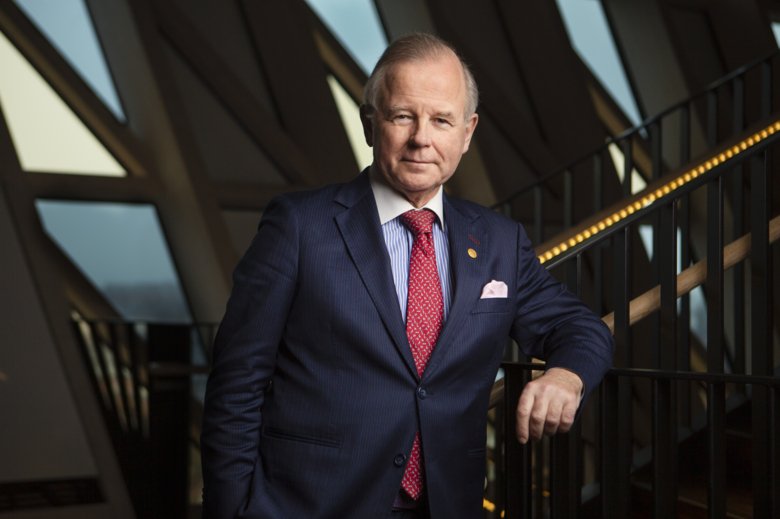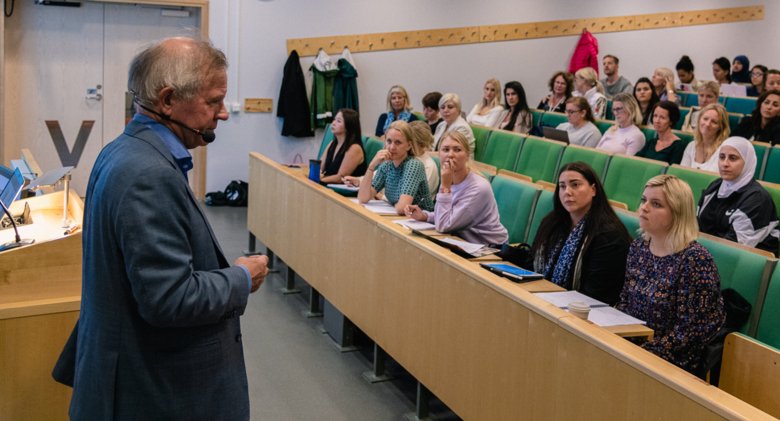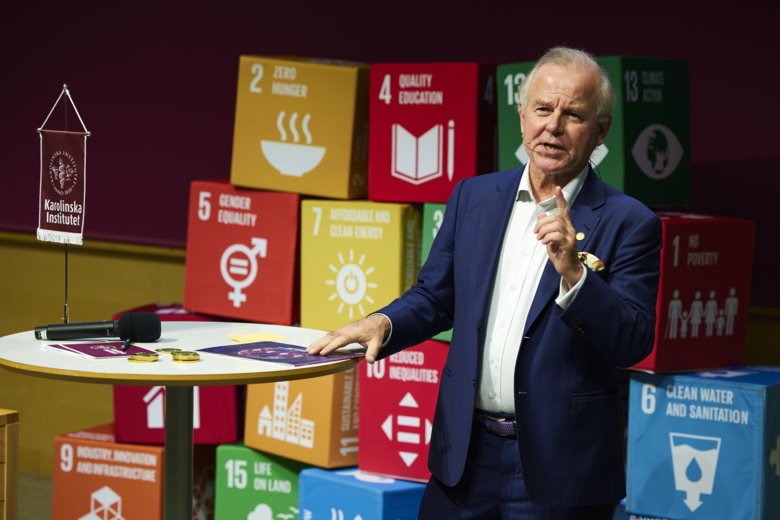Ole Petter Ottersen on his time as KI’s president - and the day he remembers the most

Ole Petter Ottersen has been president of Karolinska Institutet for five and a half years. At the end of this month, February 2023, he will be leaving his office for the last time. Of all he has seen and done during this time, one day is particularly memorable.
Text: Cecilia Odlind
“On 11 March 2020, Tedros Adhanom Ghebreyesus, director-general of the World Health Organisation (WHO), announced that the spread of COVID-19 should be characterized as a pandemic,” Ole Petter Ottersen recalls. “I realised then that at Karolinska Institutet we’d have to put aside a lot of ongoing projects and plans and refocus both our research and education. Our researchers and students demonstrated great flexibility and creativity, enabling us to deliver despite the circumstances – but were also quick to start new international collaborations to learn more about the new coronavirus and its effects. Many of our researchers were also important contributors to media information campaigns and reports.”
Today, he continues, we can see the results of all this hard work, such as the new Centre for Health Crises, which has been established to prepare all of society for the next pandemic. Almost 200,000 people have taken the online course that the university developed. And researchers at Karolinska Institutet have co-authored over 1,400 scientific papers on COVID-19, many alongside colleagues from partnering hospitals in the region.
In what way has KI changed since you first took office in 2017?
“OK, I’m biased, but I think we have a strong organisation these days and are producing new knowledge at a very high level. Every cloud has a silver lining, as they say, so even if the pandemic was an exceedingly tragic health crisis, it had several positive ramifications, not least in the way it highlighted the immense value of the knowledge that research – especially basic medical research – can generate. Developments in life science over these years have also been fantastic. There are now around 140 companies located next to our campus and I can count 15 construction cranes during my walk here. When I arrived, it was the other way round!”
Have there been moments when you’ve wanted to give up?
“No, no, no. Not at all.”
What would you have done if you’d had more time as president?
“I would have continued to work on establishing a stronger sense of community at KI, that ‘we-spirit’ we were about to build when the pandemic struck. Clinical and experimental basic research both demand more and more resources, and one major challenge is to secure financing going forward. At the same time, I think that our educational activities now also need strengthening. They’re also in need of more resources and clearer ties to research.”
What has upset you the most?
“During my time as president, I’ve repeatedly protested against the incarceration in Iran of the Swedish-Iranian doctor, researcher in disaster medicine and KI alumnus Ahmadreza Djalali. After the election, I sent a letter to the new Swedish government via the Ministry for Foreign Affairs calling for more pressure to be put on Iran to respect fundamental human rights and the rule of law, and to release Ahmadreza Djalali. The way he has been treated – and others who have been similarly imprisoned – is not just a monstrous injustice to these individuals and their families, but also a direct attack on basic democratic values and academic freedoms.”
If you could advise your younger self on your first day at KI, what would you say?
“Spend more time in the departments to get more in touch with what what’s going on there.”
What’s the main difference in professional mentality between your native Norway and Sweden?
“I’ve no evidence for this, but it seems to me to take longer to anchor decisions in Sweden.”
Have you found this frustrating?
“No. If I did, I wouldn’t be able to have this job. I’ve accepted the fact that it takes time to make changes to an academic organisation. I also think that eventually bottom-up processes can save time because they avoid conflicts that can arise later down the line. That’s one lesson I’ve learnt.”
What are your plans for the immediate future?
“Nothing’s certain yet. I’m looking for things with a global focus but I’ll also try to get back into basic research. After all, I’m a neuroscientist and I’m passionate about the benefits that medical research can bring to people around the world, not just here in Sweden. From March 1, I’ll be based at Oslo University, my alma mater.”
When have you been particularly proud of KI?
“I’m proud of KI every day. I get so much positive feedback, especially on the work our researchers and staff did during the pandemic.”
Ole Petter Ottersen on important moments and challenges during his tenure

Five important moments
- The first call. One important moment was the call I received late one June evening in 2016 inviting me to stand for the presidency of KI. “This could be interesting,” I thought. I’d looked up to KI for my entire career.
- The pandemic. A key moment was on March 11, 2020, when Tedros Adhanom Ghebreyesus, the director-general of the World Health Organisation, announced that the spread of COVID-19 was to be characterized as a pandemic. I realised then that at Karolinska Institutet we’d have to put aside a lot of ongoing projects and plans and refocus both our research and education.
- The students. I have very fond memories of the first time I got to teach medical students anatomy. It really made my day to come into direct contact with them.
- Nobel. Getting to open the Nobel Lecture with the Swedish laureate Svante Pääbo, a scientist I have long admired, was a momentous occasion for me.
- International collaborations. One moment that really sticks in my mind is the centenary celebrations at Makerere University in Uganda, with which KI has collaborated for so many years. It was obvious that this collaboration has meant a lot to both parties and for the development of local research and healthcare.

Five major challenges
- The Macchiarini case. It was very difficult to come to KI after the Macchiarini scandal. The mood was low and many people were directly or indirectly affected. I felt I had to reboot the creativity and energy that I knew existed all over KI.
- The moves. We’ve done some large-scale moves, including into Neo, Biomedicum and Bioclinicum, and had to do so without causing too much disruption to research and education.
- Organisational change. Getting a new strategy and organisation in place has also been a serious challenge.
- The pandemic. The whole pandemic was, of course, another huge challenge. Our researchers did an excellent job and our students and teachers demonstrated great flexibility and creativity, enabling us to deliver despite the circumstances.
- Global collaborations. One remaining challenge is to keep our global collaborations going responsibly in an unprecedentedly turbulent world, one in which democracy itself is under threat. We must always stand up for academic freedom and institutional autonomy, despite the serious geopolitical plight we currently find ourselves in.
